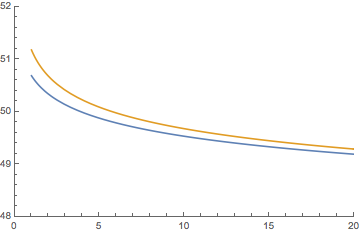As I said in the comment, $$F_a(s) = \sum_{n=0}^\infty (n^2+a)^{-s}, \qquad Re(s) > 1/2$$
Has an analytic continuation in term of the Riemann zeta function :
$$F_a(s) = \sum_{n= 0}^{A-1} (n^2+a)^{-s}+\sum_{k=0}^\infty {-s \choose k} a^k \underset {\underset{\underset{\displaystyle s \in \mathbb{C}\setminus \{1/2-k,k\in \mathbb{N}\}}{}}{ }}{\left(\zeta(2k+2s)-\sum_{n=1}^{A-1} n^{-2k-2s}\right),}\qquad (1)$$
where $A > |a|^{1/2}$
for $n > |a|^{1/2}$ : $(n^2+a)^{-s} = n^{-2s}(1+\frac{a}{n^2})^{-s} = n^{-2s}\sum_{k=0}^\infty {-s \choose k} a^k n^{-2k}$. thus, with $A= \lfloor \, |a|^{1/2} \, \rfloor+1$, on $Re(s) > 1/2$ where everything converges absolutely :
$$\begin{eqnarray}F_a(s) -\sum_{n= 0}^{A-1} (n^2+a)^{-s} &=& \sum_{n= A}^\infty (n^2+a)^{-s} \\ &=& \sum_{n= A}^\infty \sum_{k=0}^\infty {-s \choose k} a^k n^{-2k-2s} \\ &=& \sum_{k=0}^\infty {-s \choose k} a^k \sum_{n= A}^\infty n^{-2k-2s} \\ &=& \sum_{k=0}^\infty {-s \choose k} a^k \left(\zeta(2k+2s)-\sum_{n=1}^{A-1} n^{-2k-2s}\right) \end{eqnarray}$$
now since the radius of convergence of $(1+x)^{-s}= \sum_{k=0}^\infty {-s \choose k} x^k$ is $\ge 1$ for every $s$, it means ${-s \choose k} = \mathcal{O}((1+\epsilon)^k)$, and since $\zeta(2k+2s)-\sum_{n=1}^{A-1} n^{-2k-2s} = \mathcal{O}(A^{-2k})$, we have that $(1)$ converges compactly for every $s \in \mathbb{C}$ where the summand are analytic,
and hence it defines the analytic continuation of $F_a(s)$ that is meromorphic with poles at $s = 1/2-k$

